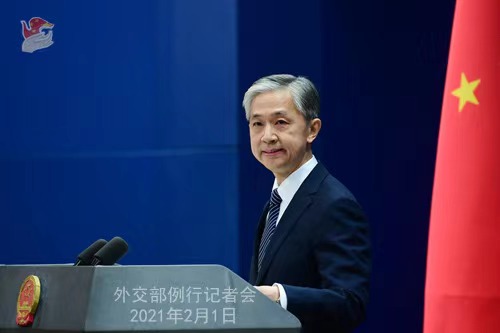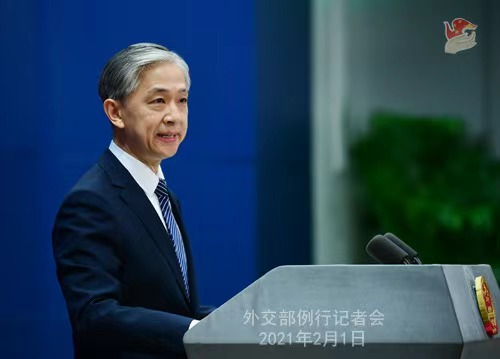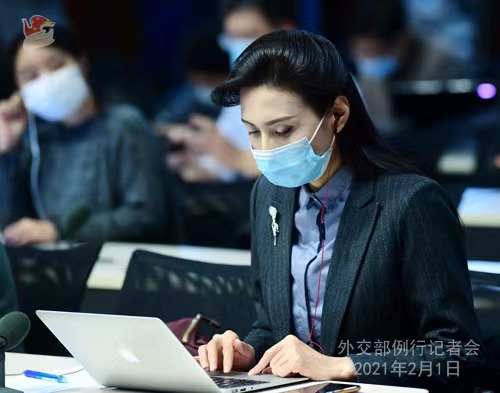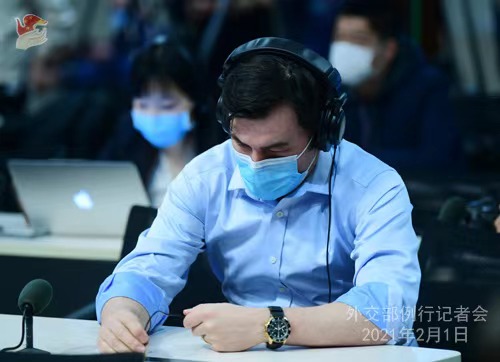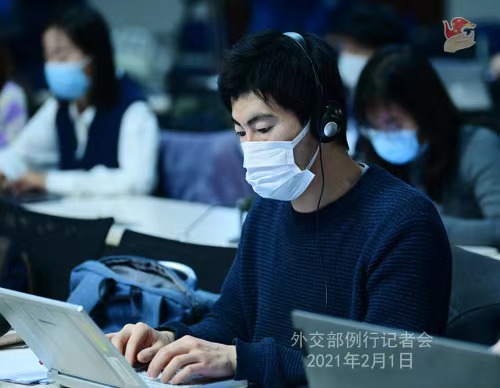| Foreign Ministry Spokesperson Wang Wenbin's Regular Press Conference on February 1, 2021 |
| 2021-02-01 23:15 |
|
In the early hours today, a batch of inactivated COVID-19 vaccines donated by the Chinese government to Pakistan arrived in Islamabad. It was the first batch of vaccine aid provided by the Chinese government to another country and a concrete step in honoring President Xi's pledge of making COVID-19 vaccines a global public good. China and Pakistan are all-weather strategic partners. Since the outbreak of COVID-19, the two sides have been supporting and assisting each other. Last year, at China's most trying moments, Pakistan was among the first countries to donate medical supplies to us in a great act of valuable support. When the epidemic situation in China eased, we supported Pakistan's fight against the virus through various means including donating medical supplies and sending medical experts. Vaccine cooperation is an important part of the joint efforts by China and Pakistan to fight COVID-19. It demonstrates not only our sincere mutual assistance as all-weather strategic partners, but also our joint efforts as two developing countries to make vaccines a global public good and promote their accessibility and affordability in fellow developing countries. The virus respects no boundaries and we are all in this together. Solidarity and cooperation is our most powerful weapon in this war. We hope all parties will take real action, provide more vaccines to developing countries, and contribute to the equitable distribution and application of vaccines across the world so that we can defeat the virus at an early date. Bloomberg: Myanmar's military detained Aung San Suu Kyi, declared a state of emergency for a year and voided her party's November election victory. The army chief's office said that the actions were taken in response to alleged voter fraud, and the military would hold a free and fair election after the emergency is over. We are wondering if China has any comment on what is happening in Myanmar? Wang Wenbin: We have noted what happened in Myanmar, and we are learning more information on the situation. China is a friendly neighbor of Myanmar. We hope that all parties in Myanmar will properly handle their differences under the constitutional and legal framework and maintain political and social stability. CNR: You just said that Pakistan is the first to receive vaccine doses from China as aid. Can you tell us if China plans to offer vaccines as aid to other countries as well or export vaccines to them? To date how many countries have you exported vaccines to? Wang Wenbin: China has been acting through concrete actions on President Xi Jinping's solemn commitment of making COVID-19 vaccines, developed and deployed in China, a global public good, thus contributing to greater accessibility and affordability of vaccines in developing countries. That's what we've been saying and what we've been doing. First, apart from Pakistan, China is also providing vaccine aid to Brunei, Nepal, the Philippines, Myanmar, Cambodia, Laos, Sri Lanka, Mongolia, Palestine, Belarus, Sierra Leone, Zimbabwe and Equatorial Guinea, altogether 13 developing countries. Going forward, we will also assist another 38 developing countries with vaccines. We also take an active part in the WHO-led COVAX and provide vaccines through this platform to developing countries. Second, China supports Chinese companies in conducting joint vaccine R&D and production with foreign partners. Vaccines made by Sinopharm and Sinovac have been exported to countries including the UAE, Morocco, Indonesia, Turkey, Brazil and Chile where clinical studies have been conducted. Third, China supports relevant companies in exporting vaccines to countries in urgent need that have approved Chinese vaccines and authorized their emergency use. For instance, Serbia has started vaccination with recently imported Chinese-made vaccines. More and more countries are approving the domestic use of Chinese vaccines. The whole world needs to pull together in order to defeat the pandemic. China will continue to provide in a timely manner, to the best of its capability, vaccines to relevant countries, especially the developing countries, and contribute its share to building a global community of health for all. We also hope the international community will work together to promote the equitable allocation and use of vaccines globally to make sure developing countries have access to and can afford them.
Prasar Bharati: This is regarding the Indian ship stuck at Caofeidian port for many months. How long will China take to determine when the cargo can be unloaded? Why is the Chinese government not able to impress the charterer to let the ships leave the port or at least allow a crew change? Reports also suggest there is laxity in the provision of medical aid to the crew who are suffering. They are not getting the medical aid in time. What's your comment? Wang Wenbin: The relevant Chinese authorities have been in close communication with the Indian side, responding in a timely manner to their appeals and putting forward practical suggestions for crew change. We have provided necessary convenience and assistance while adhering to epidemic prevention rules. As to whether the ship charterer is willing to adjust the shipping arrangement, it is the charterer's decision to make. Kyodo News Agency: I have a question about the Olympic Games. February 4 marks the one-year countdown to the opening of the Beijing Winter Olympic Games. What does China think is the significance of hosting the Winter Olympics under such circumstances when COVID-19 is spreading around the world? Then there is the uncertainty about whether the Tokyo Olympics will be held this summer. If the Tokyo Olympic Games cannot be held as promised, what will be the impact on the Beijing Winter Olympics? Wang Wenbin: On your first question, during the phone call last week between President Xi Jinping and International Olympic Committee (IOC) President Thomas Bach, the two sides reached important consensus on overcoming the impact of the pandemic to ensure a safe and successful Beijing Winter Olympic Games, and on promoting the sustained and healthy development of the Olympic Movement. The Chinese side has issued a press release on that phone call. I would like to emphasize that China took the lead in bringing the domestic epidemic situation under control and realizing economic recovery, thus creating favorable conditions for the successful hosting of the Beijing Winter Olympics. We have strictly implemented prevention and control measures, overcome the impact of the epidemic, and actively promoted the steady progress of all preparation work for the games, which have won full recognition and strong support from the international community including the IOC. We are fully confident that the Beijing Winter Olympics will be a splendid event. As President Xi Jinping pointed out, the Chinese side, with strong support from various parties, will complete all preparation as scheduled, so as to ensure Beijing 2022 is a complete success. Beijing, the only city in the world to have hosted both the Summer and Winter Olympics, will make unique contributions to the international Olympic Movement. As for your second question, we have learned that the IOC and the Japanese side are actively working on a plan to host the Tokyo Olympics with prevention and control measures in place. They are doing their best in advancing preparatory works. China will continue to support the IOC and Japan in hosting a safe and successful Olympic Games.
The Paper: A Chinese shop manager who specializes in custom-made T-shirts recently reported through WeChat that the staff of the Canadian Embassy in China ordered T-shirts with "Wuhan bats" on them in July last year. What is China's comment? Wang Wenbin: We have noted relevant reports. The novel coronavirus is the common enemy of mankind. The WHO and the international community are clearly opposed to associating the virus with specific countries and regions, as well as to stigmatizing and pinning labels on them. The Prime Minister and the Minister of Health of Canada have made similar statements on many occasions. The diplomatic and consular staff of any country stationed abroad should strictly abide by the Vienna Convention on Diplomatic Relations, the Vienna Convention on Consular Relations and the laws and regulations of the host country. As diplomats of the Canadian Embassy in China, what they have done is not in line with their positions and runs counter to the consistent position of the high-level leadership at the Canadian government. The Chinese side is shocked by this and has lodged stern representations with the Canadian Embassy in China, demanding that the Canadian side immediately thoroughly investigate the incident and give China a clear explanation. Global Times: The Atlantic Council recently published an anonymous strategy paper on China, which instigates a Cold War against China. Some media described it as "the Longer Telegram", associating it with George Kennan's famous "Long Telegram". Do you have any comment? Wang Wenbin: That the author of this so-called paper chooses to remain anonymous only reveals the dark motives and cowardliness behind this. To incite any "new Cold War" or ideological confrontation goes against the trend of the times and the will of people. The clamour for regime change and attempt to contain China is no other than a chimera. From the Atlantic Council's anonymous strategy paper to Pompeo and his likes' slanders against the Communist Party of China, these are nothing but a collection of rumors and conspiracy theories. The CPC has always pursued happiness for the people, rejuvenation for the nation and common good for the world. What the CPC has done is above board and its just cause will rally abundant support. No slander or mud-slinging will stop China from progressing. Any attempt to meddle in China's internal affairs and change China's political system will be met with strong fightback from the Chinese people. Anyone with vicious intention to sow discord between the Chinese and American people and drive China-U.S. relations to the edge of antagonism and conflict will turn out a sinner in history and is doomed to be a total failure.
Shenzhen TV: The Lowy Institute, an Australian think tank, recently released a ranking of 98 countries and regions in terms of their anti-epidemic performance. The Chinese mainland was not included in this ranking due to a lack of publicly available data. What is your comment? Wang Wenbin: Since the outbreak of the epidemic, China has put in place the strictest, professional and efficient information release system, enabling the public to access as much information as possible and as soon as possible. Wuhan City began to release official information on the epidemic in accordance with law on December 31, 2019, and gradually increased the frequency of information release. Since January 3, 2020, China has been in close communication with the WHO and relevant countries and regions through the International Health Regulations and other channels to share information on the epidemic in an open and transparent manner. Starting from January 21, 2020, relevant Chinese departments started to release nationwide epidemic information on a daily basis. Relevant Chinese technical institutions have conducted technical exchanges with more than 180 countries and more than 10 international and regional organizations. In June 2020, China released a white paper titled "Fighting COVID-19: China in Action" , which details in a phased manner the progress of China's fight against the epidemic. Facts are all we need to determine how a country or region has responded to the pandemic. Putting people and people's life first, China has taken the most comprehensive, most strident and most thorough prevention and control measures. China basically controlled the spread of the virus within more than 1 month, capped daily increase of new local cases to single digits within 2 months, achieved decisive victory in freeing Wuhan and Hubei from the clutch of the virus within 3 months. Facts have proved that under the leadership of the Communist Party of China, the prevention and control measures taken by the Chinese government have effectively safeguarded the safety and health of the Chinese people. Findings published in Science estimate that China's control measures have prevented prevented more than 700,000 infections across the country. An opinion poll in Singapore shows that Chinese people have the highest satisfaction rating for their government's performance in fighting the epidemic. While ensuring adequate domestic response, China has also been actively participating in and promoting international cooperation in a transparent and responsible attitude. China was the first to report the situation to the WHO, released the genome sequence of the virus, diagnosis and treatment plan, and other key information at the earliest time possible, and has taken various steps to help developing countries access vaccines. We will continue to work with the international community to advance relevant cooperation and make unremitting efforts for an early and complete victory over the pandemic. Beijing Daily: Ukrainian President Zelensky announced sanctions on four Chinese companies and three Chinese citizens seeking to purchase a stake in Motor Sich. Do you have any response? Wang Wenbin: We noted relevant reports. China as always opposes unilateral sanctions on Chinese enterprises by foreign governments. In the meantime, we ask Chinese enterprises to abide by laws when doing business overseas. We hope the Ukrainian side will uphold the legal rights and interests of Chinese enterprises and investors. Prasar Bharati: When is China expected to release the phase III clinical trial data of the Chinese vaccines? Wang Wenbin: Chinese companies have been putting their best efforts in advancing vaccine R&D in strict accordance with scientific rules and regulatory requirements. They are also very active in pursuing international cooperation on this front. I would refer you to the competent department for the specific details.
Bloomberg: Financial Times has reported that international companies operating in Asia are considering leaving Hong Kong out of their legal contracts due to China's recent actions. Lawyers in the region have received a surge of queries from clients about excluding Hong Kong from contracts when conducting business or entering into joint ventures. Does the foreign ministry have any comment? Wang Wenbin: Hong Kong is a society governed by law and a top-ranking city in terms of Rule of Law Index. It is an undeniable fact that after the promulgation and implementation of the national security law in Hong Kong, its legal system and business environment have been improved. The central government will continue to support Hong Kong in consolidating and enhancing its status as an international financial, shipping and trading center, developing into an international center for legal and dispute resolution services in Asia Pacific, and maintaining long-term stability and prosperity. We are fully confident in the better future of Hong Kong. FSN: There are reports that have suggested that what happened in Myanmar is a setback for the China-Myanmar Economic Corridor. Would you like to elaborate a little bit more on China's position? Wang Wenbin: I would like to reiterate that China is a friendly neighbor of Myanmar. We hope that all parties in Myanmar will properly handle their differences under the constitutional and legal framework and maintain political and social stability.
|
| |||||||||||||||
|
|||||||||||||||



